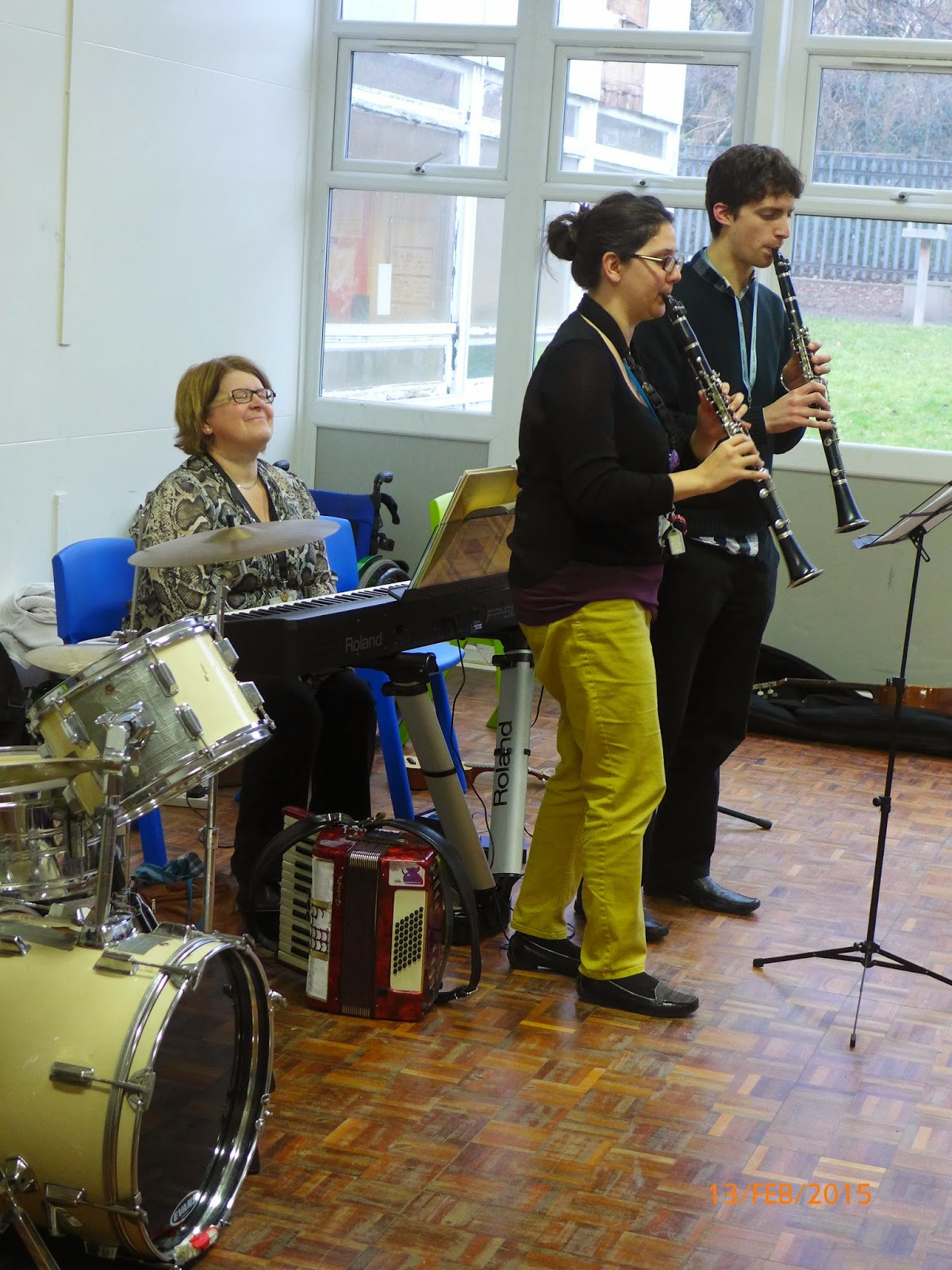 One way of teaching music is to play it, and to play it without explanation or dissection or introduction or discussion or worksheets afterwards. Without jokes, apologies or pictures.
One way of teaching music is to play it, and to play it without explanation or dissection or introduction or discussion or worksheets afterwards. Without jokes, apologies or pictures.  And such is our philosophy behind Rest of the Best. We choose about ten pieces of music from just about as many genres and we play them on as many instruments as the players we can can play. We combine usual and unusual instruments; we don't make any of them stars; we play the familiar and unfamiliar. We change the textures, the tempo, the dynamics; we invite movement and dancing, and then we invite a respectful silence. Tunes are short; the concerts are short; we leave them wanting more, not wondering when it's going to end.
And such is our philosophy behind Rest of the Best. We choose about ten pieces of music from just about as many genres and we play them on as many instruments as the players we can can play. We combine usual and unusual instruments; we don't make any of them stars; we play the familiar and unfamiliar. We change the textures, the tempo, the dynamics; we invite movement and dancing, and then we invite a respectful silence. Tunes are short; the concerts are short; we leave them wanting more, not wondering when it's going to end.And what the audiences take from what we play is in their heads and their hearts and their bodies. It's not for us to tell them how to feel or respond. We know that music education has had a chequered history; and we know that staff can be very nervous in and of music lessons, so we want them too to respond and hopefully enjoy..
If we have a message, it is that music is music, and that all instruments can play just about everything.
.
Our pannists play classical; our recorders play folk, the accordion plays French, the saxes play everything, the kit plays softly. You get the idea.
 We are also privileged to include in our band, Bart, who is a wheel-chair user; we didn't pick him because he is a wheel-chair user; we picked him because he is a drummer, and because he is a member of the ArtForms staff. But we do perform in special schools and we perform to other wheelchair users; we don't say, yes, anyone can play kit; we just wheel out Bart; well actually Bart wheels himself out, and we pile up instruments on top of him to carry to and from the van.
We are also privileged to include in our band, Bart, who is a wheel-chair user; we didn't pick him because he is a wheel-chair user; we picked him because he is a drummer, and because he is a member of the ArtForms staff. But we do perform in special schools and we perform to other wheelchair users; we don't say, yes, anyone can play kit; we just wheel out Bart; well actually Bart wheels himself out, and we pile up instruments on top of him to carry to and from the van..JPG)
Bart is inspiring by just being himself; and the music is inspiring by just being [carefully selected] music.
.JPG) This year Mike the guitarist was having his knees operated on [eek!]; all the other guitar specialists were unavailable, so violinist, Fiona, and saxophonist, Cathy did the honours. Yi Bai and I shared bass guitar. Mary played a selection of woodwind from tin whistle to clarinet; Diane brought out keyboards, accordion, ocarina and her latest discovery the ukele. Yi Bai did bass, kit and steel pan, Melvin, Natalie and I played steelpans, Janet was everything woodwind, Tim did pans and clarinet, Joanna does anything we put in front of her; I also sang. We were lucky also to have Yi Bai and Pyusha-the-cellist on work experience with us. We also never had the same ensemble from one day to the next, or even one school to the next!
This year Mike the guitarist was having his knees operated on [eek!]; all the other guitar specialists were unavailable, so violinist, Fiona, and saxophonist, Cathy did the honours. Yi Bai and I shared bass guitar. Mary played a selection of woodwind from tin whistle to clarinet; Diane brought out keyboards, accordion, ocarina and her latest discovery the ukele. Yi Bai did bass, kit and steel pan, Melvin, Natalie and I played steelpans, Janet was everything woodwind, Tim did pans and clarinet, Joanna does anything we put in front of her; I also sang. We were lucky also to have Yi Bai and Pyusha-the-cellist on work experience with us. We also never had the same ensemble from one day to the next, or even one school to the next!All our staff also play [semi-]professionally. And we get to know each other and develop a good sense of ensemble over the three days. [At a Westminster briefing recently I heard various panel members informing us that, for good music education we needed musicians. Well we have those musicians but they are also, and sometimes primarily, trained teachers]
This year our schools were Allerton C of E, Beechwood, Richmond Hill, West Oaks, Oakwood PRU, City of Leeds, Stonegate, Lighthouse, in inclusive and separate spaces, to mainstream children and to those with additional needs.
Our repertoire this year included Grieg's Morning, Five Hundred Miles, Redemption Song, Bach's Minuet in G [to which we got dancers up], The Locomotion, Wavin' Flag; the instrumentalists brought their own tunes.
.JPG)








No comments:
Post a Comment